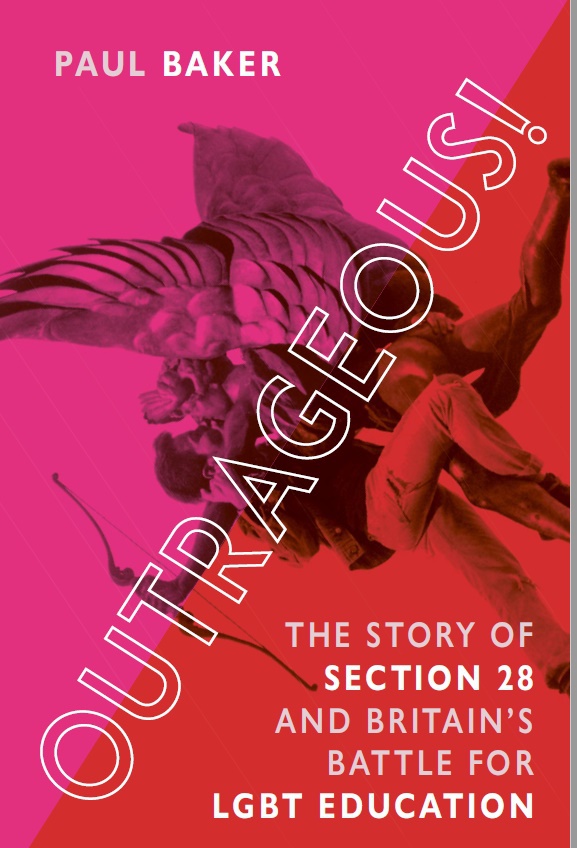Paul Baker
Paul Baker’s Outrageous! The Story of Section 28 and Britain’s Battle for LGBT Education tells the full story of Section 28: the background to the Act, how the press fanned the flames and what politicians said during debates, how protestors fought back to bring about the repeal of the law in the 2000s, and its eventual legacy. In this post, Baker reflects on the parallels between the homophobic 1980s and the present day, and asks: Section 28 was repealed in 2003 – but do we have cause for complacency?

The day I turned 16, a group of young women invaded the BBC 6 O’clock News during a live broadcast to protest Section 28, a law that would come into being the following day. The law forbade local authorities from intentionally promoting homosexuality or the ‘acceptability of homosexuality as a pretended family relationship’. It was a nasty piece of legislation which had the unintended consequence of galvanising the LGBT+ community to fight back.
When I wrote the story of Section 28 I was aware that it could end up being quite a depressing account. While the law didn’t specifically say anything to stop schools from countering homophobic bullying, it was so badly-worded and vague that teachers became afraid to engage with anything around homosexuality. As a result, a large amount of bullying went unchecked. A study caried out by Stonewall in 2007, four years after Section 28 had been repealed, found that even then, 65% of LGBT pupils had experienced direct bullying and only 23% had been told at school that homophobic bullying was wrong. Since my book came out teachers have written to me to express the guilt that they feel about the Section 28 years.
I did not want the book to have an angry or depressed tone, so instead I focussed on the resilience, creativity and bravery of the activists who fought against Section 28, lobbying MPs, marching on the streets, demonstrating outside schools and eye-catching ‘invasions’. There was a fair amount of camp humour to be had in writing about these protests, and I also poked fun at some of the people who campaigned for Section 28. I finished the book, noting with concern the appearance of legislation similar to Section 28 in countries like Russia and Hungary as well as pointing out that the jury is still out on the government’s recent Children and Social Work Act which requires ‘all pupils to have been taught LGBT content at a timely point’. I ended the final paragraphs with quotes from some of the people I had interviewed, including Angela Mason, Ian McKellen, Chris Smith and Michael Cashman.
Since the book came out, one question has come up at every public talk I have given on Section 28 – do I think that there are parallels with Section 28 and the current treatment of trans people? In the 1980s, the British press whipped up its readership into a moral panic with stories that gay people were trying to proselytise children. Headlines like ‘Save the Children from sad sordid sex lessons’ and ‘Vile book in School: Pupils see Pictures of Gay Lovers’ contributed to a worsening of attitudes towards gay people – by 1987 three quarters of the public thought that being gay was always or mostly wrong. Fast forward a few decades and it is trans people who have been the focus of a similar moral panic, with children in the middle again. It’s been coming for a while. In 2012 I analysed 902 UK newspaper articles which referred to trans people, finding that they were generally represented in reasonably large sections of the press as receiving special treatment lest they be offended, as victims or villains, as involved in transient relationships or sex scandals, as the object of jokes about their appearance or sexual organs and as attention-seeking freakish objects.
A repeat study I carried out on similar articles from 2018-19 found a few improvements – the sexualising language and Alan Partridge-style jokes had largely gone. But what was there instead was more obvious hostility, painting trans people as unreasonable and aggressive. There was a mixed picture when it came to topics like trans children and transphobia, with around half of mentions indicating a hostile stance. This is textbook stuff – make fun of a minority until they start asking for rights. Then it’s time to switch tactics and call them militants and say they’re after your kids.
An outstanding problem with current legislation is the legality of so-called conversion therapies, aimed at changing people’s sexuality or gender identity. These practices are hokum and incredibly damaging – they should have been outlawed decades ago. The British government have shown ambivalence towards the subject. Initially they said they would legislate to ban it. Then in March 2022 a leaked document indicated that they were going to scrap the legislation. This resulted in a backlash and they have since signalled that they will pass a law to ban conversion therapy, but not for everyone. If you’re over 18, you can still ‘consent’ to have ‘non-physical’ conversion therapy. And the law won’t cover gender identity. This is not enough and sends out a worrying message.
In the US this year, Florida recently passed a ‘don’t say gay’ law, similar to that of Section 28. At least a dozen other states are considering similar laws. This is happening under Joe Biden – a Democratic. Could it happen again here? America has a different political system to the UK, its states have more self-governance and the 9 life-long members of the American Supreme Court hold disproportionate influence over the political direction the country travels. With that said, not many people predicted Brexit 5 years ago. What recent history tells us is – do not be complacent. These are battles that do not necessarily stay won, and they can be resurrected, often as a way of distracting the populace during periods of economic hardship. We are entering such a period. We may not agree on the best forms of activism, but that can be a strength. One aspect of the resistance over Section 28 that my book charted was the wide range of tactics that were used, with protests being both serious and funny, diplomatic and confrontational. I urge future activists to similarly use a range of non-violent ways to oppose homophobia and transphobia and make a difference. I hope the story of Section 28 is over. Let’s make sure it is.
 Paul Baker is Professor of English Language at Lancaster University. He has written 22 books on language, sexuality and social history, covering topics that include Section 28, Polari, gay men in the merchant navy and newspaper coverage of LGBT+ people. His most recent book is Outrageous! The Story of Section 28 and Britain’s Battle for LGBT Education (Reaktion, 2022). He tweets from @_paulbaker_
Paul Baker is Professor of English Language at Lancaster University. He has written 22 books on language, sexuality and social history, covering topics that include Section 28, Polari, gay men in the merchant navy and newspaper coverage of LGBT+ people. His most recent book is Outrageous! The Story of Section 28 and Britain’s Battle for LGBT Education (Reaktion, 2022). He tweets from @_paulbaker_

NOTCHES: (re)marks on the history of sexuality is licensed under a Creative Commons Attribution-NonCommercial-NoDerivatives 4.0 International License.
Based on a work at www.notchesblog.com.
For permission to publish any NOTCHES post in whole or in part please contact the editors at NotchesBlog@gmail.com




